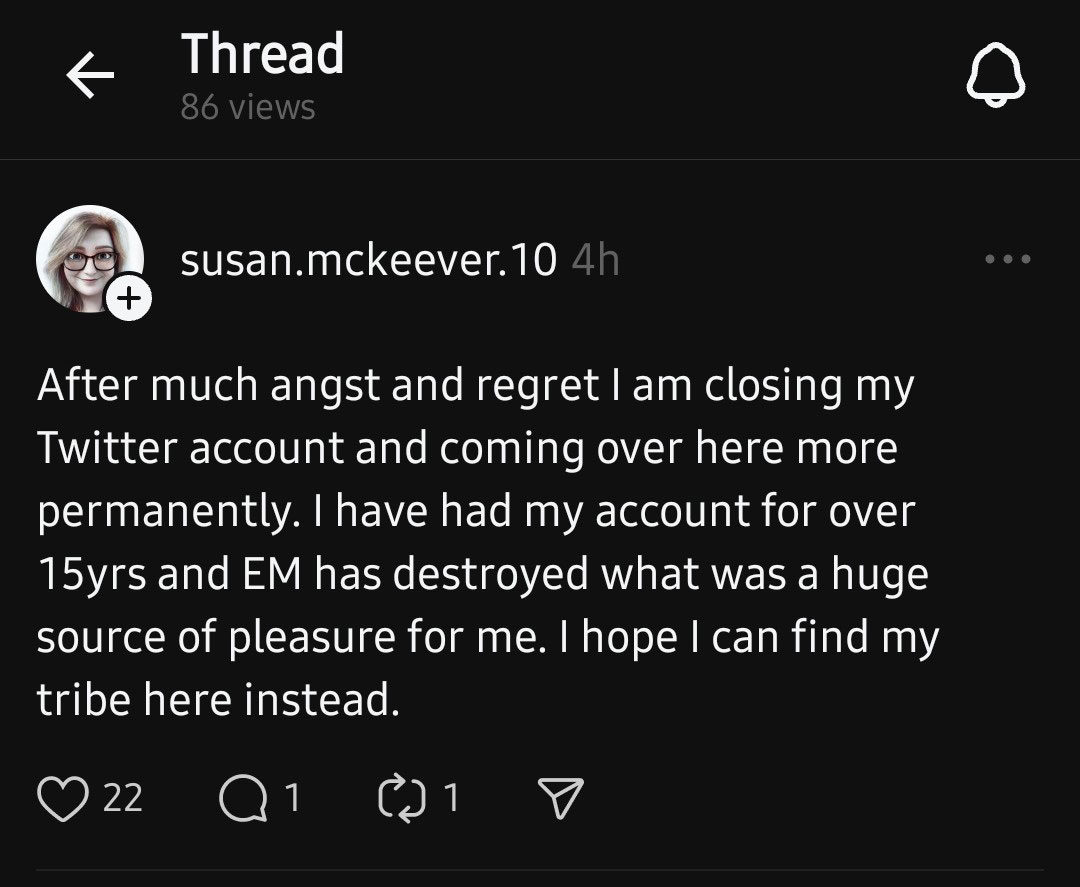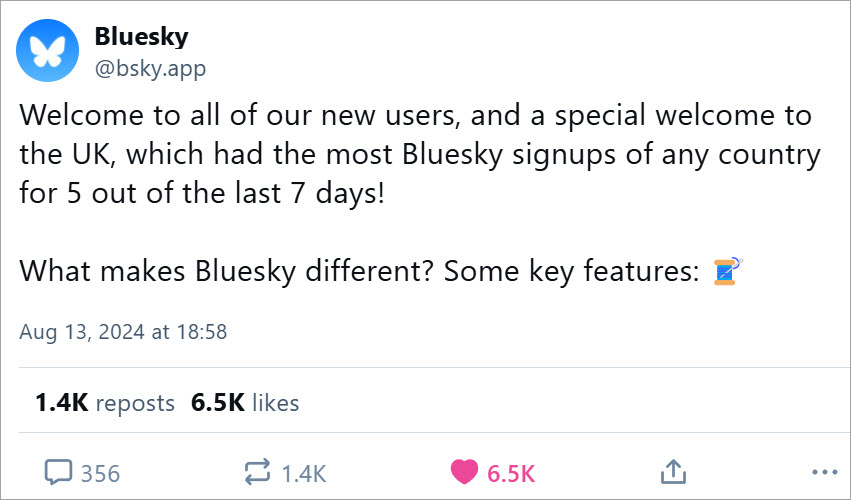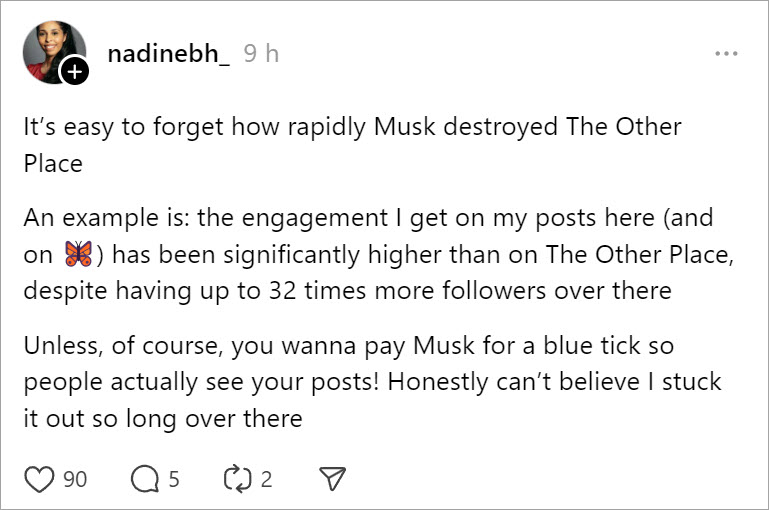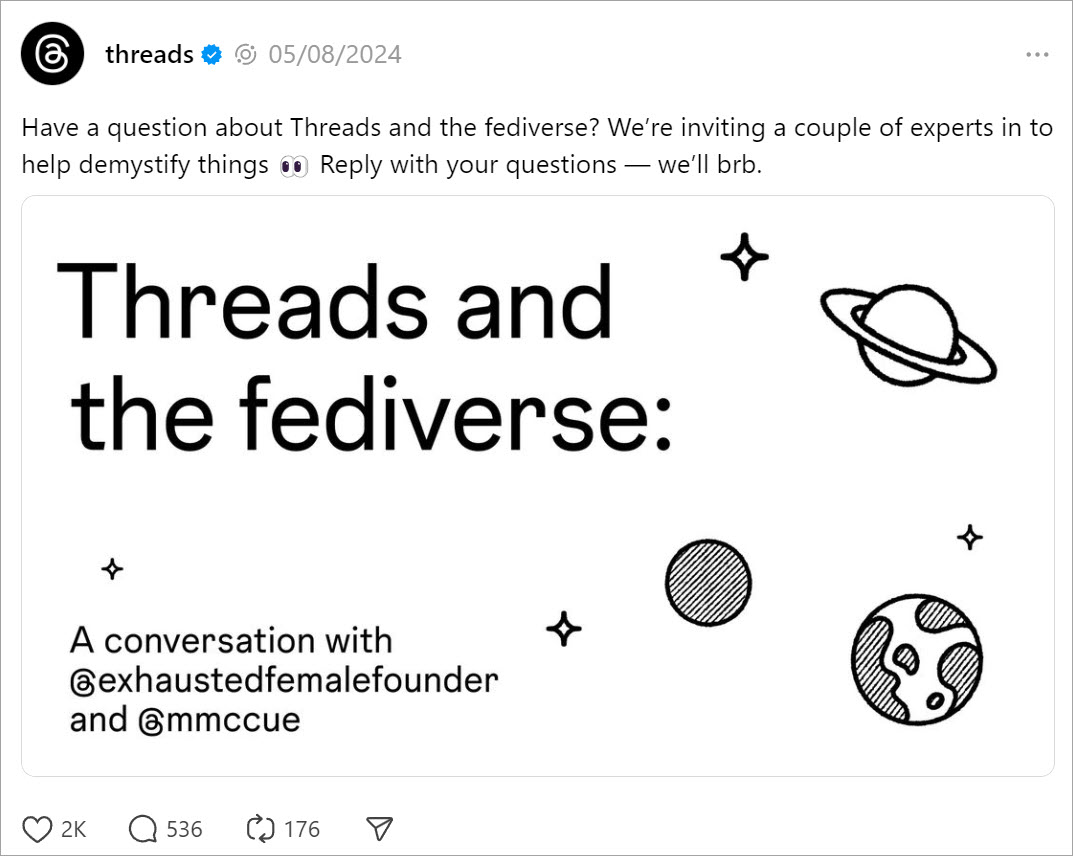
In the wake of Elon Musk’s public spat with Keir Starmer in recent weeks, which saw the X owner spread falsehoods and insults about the UK riots that took place from late July into the first week of August, a growing number of users have begun to abandon the platform formerly known as Twitter.
We’ve witnessed a steady stream of departures, with many flocking to alternative social networks like Threads and Bluesky. Every day over the past week and more, my Threads feed has been overflowing with people setting up their handles and joining Meta’s alternative offering that launched in July 2023 and now has more than 200 million average monthly users.
Some new arrivals on Threads talk about transitioning. Others are more direct, saying they’ve entirely quit X. What nearly everyone has in common is not only disgust at Musk’s ugly personal behaviour but also a response to the platform’s failure to address hate and disinformation, which has been exacerbated by Musk’s own actions and algorithmic changes.
Some optimistically talk about an exodus, a mass movement away from X to a perceived better place like Threads. It certainly felt like a torrent to me, with Threads hashtags like “Xodus” and “TwitterExodus” trending, but the data didn’t support the idea of any kind of actual “exodus“, as explained by Sarah Perez writing in TechCrunch last week.
Bluesky also benefited from the sudden willingness of people to seek places other than X, reporting that the UK had the most Bluesky signups of any country for five straight days in the previous week.

Flexing Political Will
To illustrate this point, alarm and concern about hate and disinformation is a clear driver behind a migration of Labour Members of Parliament that gathered momentum this week, with many arriving on Threads and on Bluesky.
Earlier this week, the Guardian reported that newly-elected Labour MPs took to WhatsApp groups last weekend to raise growing concerns about the role X played in the spread of misinformation amid the UK riots.
“Musk turned X into a megaphone for foreign adversaries and far-right fringe groups seeking to corrupt our public sphere. Nobody should have that power. A new generation of legislators are flexing their muscles, people who’ve grown up understanding the power of these platforms. By talking down Britain, Musk has placed X firmly in our sights.”
– Josh Simons, Labour MP for Makerfield, in the Guardian, 12 August 2024.
As politicians seek alternative platforms to engage with their constituents, Threads and Bluesky have emerged as current primary potential options.
Bluesky promises to give users more control over their online interactions and reduce the spread of disinformation. Threads, which allows users to share longer-form content and make edits to published posts, has been praised for its more nuanced and respectful conversations.
And that is a key point – respectful conversations, something X is renowned for not enabling at all since Musk’s takeover in 2022. In light of this, there are concerns that an influx of politicians may unwittingly stimulate the kind of nasty troll-like behaviours X personifies when it comes to discussions about politics.
Maybe one answer to that is to provide politicians (in the UK at least) with their own unique place, such as an initial idea articulated by Andy Piper:
“The UK Parliament should have a sovereign owned/operated Mastodon instance for one thing. More difficult to provide a single answer for candidates and broader party interests, but in principle with federated social accounts the location does not matter so much, as long as they can be discovered and followed.”
– Andy Piper on Threads, 14 August 2024.
(Update 17 August 2024: Andy Piper responded further to his initial comment on Threads with a detailed post on his blog. He advocates for the UK Parliament to establish a sovereign Mastodon instance, emphasizing the importance of digital autonomy and control over data. He argues that such a move would ensure that communication remains under the jurisdiction of UK law, providing greater security and accountability. This instance would allow MPs to communicate directly with constituents without relying on commercial platforms like X, which are subject to external influence. Andy sees this as a step toward digital independence and protection of democratic processes. You can read more in Andy’s post titled Fediverse for Freedom.)
Creating A New Normal
Something feels very different about all this, as if a shift in time and space is happening.
The sense I get from these recent events isn’t so much about an exodus or wholesale migration, it’s much more about a gradual unravelling of X where these events I’ve talked about here are tipping points that set the scene for further unravelling.
I don’t think it signals the forthcoming end of X, more a sign of what might become of it under Musk’s continuing erratic leadership – a niche network of disinformation and untruths, populated by right-wing extremists, trolls, and the euphemistic ‘bad actors’ we hear so much about. As X slides into irrelevance and becomes mired in arguments and disputes with advertisers and former employees, and other stakeholder groups, it might limp on for a few years but it won’t count for much compared to other platforms.
Furthermore, the shift towards alternative platforms like Threads and Bluesky is significant. It reflects a growing desire for online spaces that prioritise respectful conversations and accurate information. For politicians, this means finding platforms where they can engage with their constituents without being drowned out by hate speech and disinformation.
Indeed, that’s what everyone is looking for.

Bluesky, with its focus on transparency and user control, offers a promising alternative. Founded by Jack Dorsey, the former co-founder and CEO of Twitter, Bluesky aims to create a more civil and respectful online environment. Its emphasis on community moderation could help foster a more constructive dialogue between politicians and their constituents.
A drawback for Bluesky could be its scalability – is it ready to take on board a large influx of new users that could be a flood?
Threads, on the other hand, has already shown its potential for nuanced and respectful conversations. With its longer-form content and editing capabilities, Threads allows for more thoughtful and considered discussions. Its connection to Instagram and Meta’s resources could also help it scale further and accommodate an even larger user base.
Meanwhile, Bluesky and Threads are driving their ideas of federation, where posts are shared across the emerging fediverse. This concept of federation allows users to share content across different platforms, creating a more interconnected and diverse online ecosystem. For example, Bluesky’s AT Protocol enables users to share content with other platforms that support the protocol, while Threads is implementing federation with the ActivityPub protocol to allow users to share content with decentralised platforms like Mastodon.

Moreover, the potential of “identity portability” in the fediverse could revolutionise the way users interact with their communities on social networks. Identity portability refers to the ability of users to take their online identities (ie, their social network handles) and content with them across different platforms.
This means that you can maintain your online presence and connections without being tied to a single platform. For social networks, this could lead to a more decentralised and user-centric approach, where platforms compete on the quality of their services rather than the size of their user base.
It’s crucial for these alternative platforms to maintain their focus on respectful conversations and accurate information, ensuring that they don’t become echo chambers for political and other forms of extremism or disinformation.
The gradual unravelling of X under Elon Musk’s leadership may indeed signal a shift in the social media landscape, that shift in time and space I mentioned earlier. As a result of X’s failure to address hate and disinformation – indeed, X is perceived as encouraging hate and disinformation by permitting political extremists to be active on the platform – users are seeking out alternative platforms that prioritise civility, trustworthiness and accuracy, X may find itself increasingly isolated and irrelevant.
This picture might radically change, though, if radical change comes to X, eg, with a new owner. But time is not on X’s side.
“The whiff of Failing Social Network Syndrome gets stronger by the day. Advertising revenue has fallen off a cliff; commercial deals have collapsed; and regulators are closing in with very real threats of catastrophic fines. A former Twitter executive has called for Musk’s arrest for stoking unrest in the UK … X is now in the full flailing about stage of Failing Social Network Syndrome, suing advertisers who followed Musk’s advice to stay off the platform.”
– Dave Lee on Bloomberg, 14 August 2024.
In summary, the future of social networks is more likely than not to be one where platforms like Threads and Bluesky become the norm, offering a more constructive and respectful online environment for users, politicians, advertisers, journalists, influencers, and other stakeholders alike.
As these alternative platforms prioritise civility, trustworthiness, and accuracy, they will likely attract a diverse range of users and communities, creating a more vibrant and inclusive online ecosystem.
Ultimately, this shift towards more responsible and user-centric social networks will benefit not only individuals but also society as a whole, fostering a more informed, engaged, and respectful public discourse.
Related Reading:
- Digital Walls: Boundaries in the Evolution of the Public Square (7 February 2024)
- The hate speech problem on X: a test of conscience for users and brands (18 November 2023)
- Calling Time on X (17 October 2023)
- X, Moral Bankruptcy, and the Business of Hate (8 October 2023)











